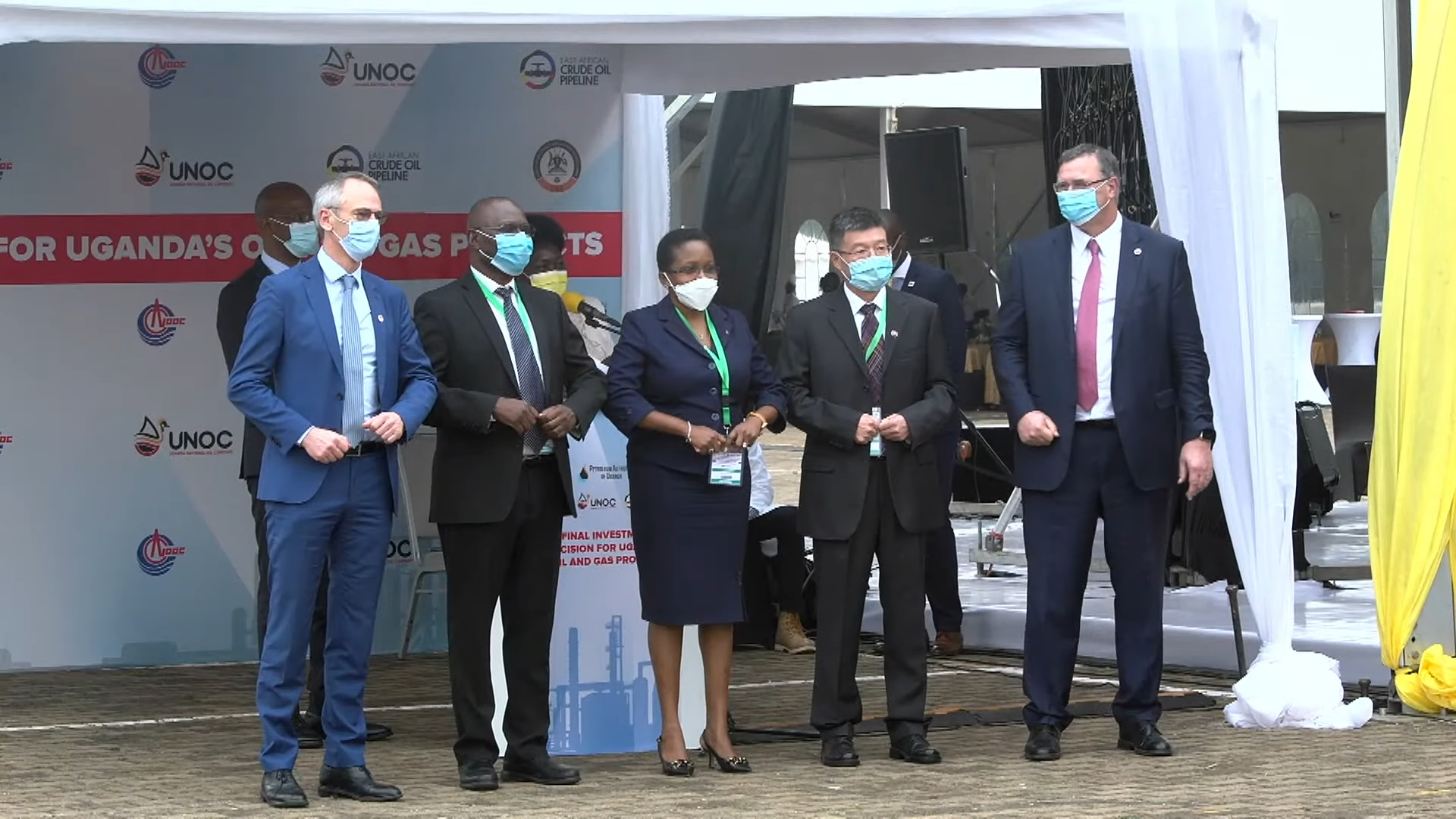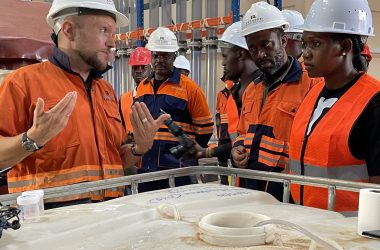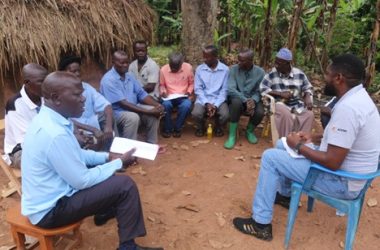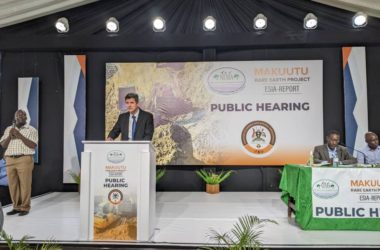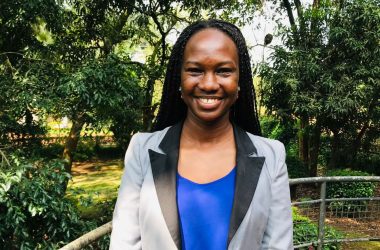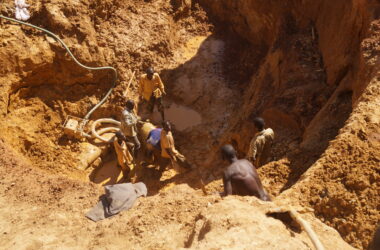Following the announcement of the Final Investment Decision (FID), seasoned oil industry expert, Dr. Elly Karuhanga, shares his views on its implications for Ugandans. The interview was hosted by Stanbic Bank Incubator’s Tony Otoa on his Twitter Space.
You of all people know we have been waiting for this thing for a very long time. Tell me what you thought today as you internalized what happened yesterday, 1st February 2022.
You know there are certain things that happened and people don’t get the impact of that event. There was an event in 1986 when the guerillas from Luweero took the reins of power in Uganda from past regimes. That event was very fundamental for the people of Uganda. We were 14 million people, we are now 45 million. So there are 30 million people who have been born since then. Twice the current population of Uganda have grown since that big event. There is this event of yesterday that is not understood, but it is a big milestone.
I want the listeners to know that yesterday’s event was huge. The 1986 event made Uganda no more a refugee exporting but importing country. People started coming home. With yesterday’s event, capital will start coming home. Capital flight will be checked. That’s not something people will sit down and fathom. But as a pathfinder and somebody who has observed these things, capital is going to fly from abroad into Entebbe. It will be driven by various tax operators and meet and greet people at various hotels and capital will settle down here. Capital will be coming in because it will be assured that it has a place and it’s not intimidated, so yesterday’s was a great event.
I just want to run a little bit of history; you know, many people on this forum will probably not have an idea of our oil story in Uganda. Just allow me play something here to help them get that idea.
Tony Otoa then plays recording of Irene Batebe, the Permanent Secretary of the Ministry of Energy and Mineral Development (MEMD), speaking at the FID event: “So these reports date back to pre-1980 when oil exploration was undertaken intermittently through the 1930s but came to a halt during WW2. Serious exploration resumed in the early 1980s with the first Petroleum Exploration & Production Act enacted. These reports were fortified in 1986 by President Museveni when he issued a policy directive to ensure capacity building, data acquisition and promotion and monitoring compliance of licensed companies. In 1991, arising from that report, we saw the signing of the first PSA. Consequently, a lot of work was done and in 2006, Uganda discovered commercially viable deposits.”
I know you have been very pivotal in this conversation since 2006 when you were President of Tullow Oil as the first African and Ugandan to hold that post. Give us a highlight of your career.
The position of Tullow President was only unique to me in the whole group and even when I retired it was never filled by anybody.
I happen to be so lucky because I am the only Ugandan who happened to have signed a PSA with Government of Uganda on behalf of Hardman Resources and Tullow. That was an important occasion. The President of Hardman was there witnessing the first oil out of the ground. When it came out of the ground, we had to flare it. That is however not allowed anymore but, when you talk of flaring, it appears like you are just lighting a cigarette, no. It is an occasion I want to describe. We were told to drive about half a kilometer away from the Christmas Tree (the drilling point) then low and behold, out of nowhere a huge amount of black smoke came out of the ground up the sky and once it reached halfway, it produced so much fire that I could see the clouds burning. It was a huge mammoth fireball in the sky and you could feel the heat all over you. That is something I’ll never forget. It told me underground where we were standing was oil.
Ugandans have been excited about this for quite some time. People who participated in the first period when you were President of Tullow are probably, you know, defunct and some of them overly invested and are not here anymore. What are the reassurances for a Ugandan local investor or one who wants to get into the sector, understand it and participate in it? What is your advice?
It’s not my advice, it is my dream. I would love to see a Ugandan or group of Ugandans get an oil block and work and develop it. In fact, UNOC (Uganda National Oil Company) has a block and is already looking for partners and because of the nature of capital required, Ugandans haven’t yet gotten that kind of capital and even if they got together, they are not sure of that industry because this is the riskiest business you can get into. So many companies have collapsed when they go into oil exploration.
Kenya started oil exploration in 1960s and more than 200 companies have got graveyards in Kenya. The beauty about our oil here is that the blocks which are available have been so well investigated by the departments of oil here that you can surely bet you will get oil. So these available oil blocks are more or less risk-free. So this is the time I would like to see Ugandans get together or get a company with foreigners to participate in any of the available oil blocks.
Let’s go back to the local content opportunities of providing goods and services. How prepared are we as a country?
There are certain key pillars for these opportunities like employment of citizens; to be able to get employed in an oil company and acquire skills. That would be build the human capital of Ugandans to participate in the oil industry. Then build their capacity, build their enterprise development; let the companies use local goods and services, transfer knowledge and technology when you arrive here and you are a foreigner. To me that is what is required.
We need to register on the National Talent Register (NTR) for you to be able to get employment and people will find you. Since last night (Tuesday) a flurry of activity is going on in the whole world in the oil industry and they will be looking for Ugandans. They will go to the NTR to look for you. Your CV must be there. What does it cost you? Just write your CV and throw it on the NTR and they will find you and not only in Uganda, even abroad.
And for the people listening in, the NTR can be found on the Petroleum Authority website. This is where you can input your information so you can be found by these companies that are beginning to have action in-country.
And regularly check on the Petroleum Authority and Uganda Chamber of Mines and Petroleum websites because they keep updating and looking for people.
Let me play another clip and really focus on what I wanted us to delve into today. This is the voice of Patrick Pouyanne, the CEO of TotalEnergies.
“Today with the FID, the project fully enters the construction phase and we will award the main contracts for Tilenga, Kingfisher and EACOP; they will be signed in the coming days. Again, they represent the commitment of $10 billion by all the partners. The development of such a major project for Uganda and Tanzania is of course transformational for both countries. And our ambition is to make it an example of shared prosperity, country value and sustainable development. We are fully aware of the transformational opportunities for Uganda and Tanzania, expectations of national content are high but they should be met, Honorable Minister. And we are committed to be successful in this domain in collaborations with private sectors of both countries. For (our) operations worldwide, national content and active participation of local companies is critical for the success of such large projects.”
There he is talking about local content which you have been pushing for quite sometime. Why is it important to have local content at the forefront of these conversations? We all know some contracts have started moving or some jobs have started. What does it mean for local content, how can we get more people in? You have talked about the NTR but beyond that, what do we have to do for goods and services?
In 2016 the National Content regulations were published and they ring-fenced 16 goods and services for Ugandans. You have to bear in mind that there are indirect, direct and specialist services. Let me take an example; there will be a camp run by McDermott with 4,000 people in Buliisa in Tilenga. A local security company has to provide them security. This must be a Ugandan-owned security company.
Then, food and beverages. No country that I know in history that discovered oil especially in Africa, was allowed to provide food from locals in its camp where you have 4,000 – 10,000 people because that food would have to be certified. But PAU has insisted that they must have Ugandan food, and the oil companies have agreed. So we can use our beef which we cannot even export because it’s not allowed abroad. We can use our milk, tomatoes. Then hotel accommodation and catering must be by Ugandan companies. There are two local companies that have already won catering contracts, one of USD 80 million and another I think of USD 40 million. We have never had such amounts of money in our hands. We are talking about chefs and people who have been running restaurants serving 100 plates, now they’re going to serve 5,000.
Then human resource management firstly, recruitment agencies. I have a friend in True North of NFT, these companies are Ugandan-owned. Office supplies, stationery, fuel supplies must all be by Ugandans. We have some young Ugandans who have been making a lot of money and I’m so happy with them in land surveying. You have heard companies like NEWPLAN and all these people. They have been making quiet money because they have to survey the pipeline route, well pads and all.
Then clearing and forwarding business. Now, most of our people have been living off this sector but this is going to be huge business. Big logistical nightmare issues. (For example) crane hire. These are areas many Ugandans have not been participating in but these people need a lot of cranes. All you need to do is get together, buy yourselves some cranes, sit back and they will hire them and you make business.
Then all locally available construction materials – cement, iron sheets. Civil works like the early works we have been seeing going on – fencing, plumbing. Then environmental studies and impact assessments. I know some young Ugandan ladies at a young company that started recently doing a lot of environmental studies and impact assessments and they are quite happy.
ICT services and waste management is a preserve of Ugandan companies. I know of foreign companies which have come here and almost won tenders but they did not have local content. They were told to go back and look for a local content partner, a Ugandan. Legal and insurance services. I must thank you Tony you are heading a very interesting organization that is bringing in our SMEs into business. When we say locally-produced goods, you have done a wonderful job.
Let me play a clip where you talked about opportunities before the upcoming projects at the just-concluded oil and gas SME conference we hosted in December last year.
“…I am very happy to share this with you. If there are 15,000 people living in these camps and they expected to be fed daily… Let me take the example of only a 5,000-man camp you can always multiply by 3 whatever I say. This is an area ring fenced for Ugandans. Oil companies are very specific; they study everything, that’s how they make profit or else they would make losses. 23,000 trays of eggs are required daily in a 5,000-man camp which are not available by our current standards in Uganda. FID has been approved by the grace of God by CNOOC and Total. That’s breaking news but I haven’t heard government announce. They cannot announce because they have not passed some regulations but the companies have cleaned their eyes, everything is in our hands. If you are an SME in the business of poultry, now you know we have a market. They will need potatoes because at all meals they put a potato for 5,000. Now you multiply the 23,000 trays by 3 that’s about 70,000 trays. They will need 320 bags of potatoes…”
We can go on and on with the statistics but what is interesting is that the need for food is quite humongous. The opportunities available here for women and the youth are quite enormous. Let me play another interesting clip here that sums up your sentiments about the food issue and here you talk about beef…
“…they need thousands of tonnes of meat of every description, so we herdsmen who have always known that you just spend the whole day looking at your cows with your stick on your shoulder and you are whistling and looking at your cows and singing their names, there are people who want to eat them.”
That’s you talking about cows and there are people who want to eat them. Well, moving on to agriculture, your thoughts Dr. Karuhanga.
Well I just talked about eggs and stuff like that but we have fisheries and, I don’t know what to say about the food, but I don’t want you to forget that I want to compliment you on training SMEs to do tenders to win business with oil companies because it is not a walk in the park to win business in Total or the sub-contractors who have got these camps and businesses. You have to be trained and Stanbic has set up an incubation center with an MD in whom I am so proud. You have trained more than I don’t know how many SMEs …
At the moment it’s 1,500 in oil and gas and the ones participating are 100 at the moment and we intend to do more.
You have been training these companies in bid management, financing, corporate governance, HSE standards and you have trained so many so far. There are others who have been trying to do the same. There are other initiatives through the MAAIF (Ministry of Agriculture Animal Industry and Fisheries); there are quarterly supplier workshops which Total and CNOOC have been carrying on; PAU has been holding national content conferences in Kampala and the Albertine Graben; the UCMP holds big conferences every year; we have our monthly get together where we meet and inculcate ideas of this industry and meet big and small companies; PAU has implemented a $500,000 project funded by ADB to enhance all these capacities and linkages of more than 200 MSMEs along the EACOP route only. PAU has spent half a million dollars in the 10 districts along the EACOP route.
We actually won the contract to supply the service to Ugandans so we have kick started the process to train 200 businesses along the EACOP route and we are trying to give them access to the market, contracts and also prepare them to do better and live better beyond oil and gas.
Fantastic! And we have formed the oil and gas trainers’ association with more than 30 organisations training oil and gas people. Kigumba (UPIK), Kichwamba, Makerere University and all these almost 50 universities all train and they have formed an association – I was graciously given the honour to be their patron and the ministry of education and sports has upgraded its technical and vocational training to provide in-country international certifications.
The renowned certifiers of the world City and Guilds, has allowed Kigumba to give its certificates to Ugandans in Uganda. It was breaking news that you can be certified in Uganda by these institutions. This means you can work anywhere in the world. If an opportunity arises you can work in Australia, Canada – you will not be asked, all you need is to show it (the certificate). We have certified more than 4,000 technicians in Uganda. There is no country with 4,000 trained and certified technicians before they produce oil. We are the first in the whole world. Our NTR has over 3,500 people registered on it.
Uganda discovered commercial deposits of oil at the same time Ghana did and as you know Ghana run into production. Right now they are working backwards dealing with the policies, laws, regulations and all of these things. On the other hand, Uganda decided to focus on creating a structure to guide and regulate the sector. I think this is one of the things we should applaud the country for especially that we were complaining that everything is so slow. Sometimes being slow can be beneficial in safeguarding yourself and I think we need to acknowledge that.
That is something that I experienced personally because of that decision. We were really hated and almost shunned. Every year I attended oil and gas conferences in Cape Town where we have an Oil Week. Normally people would be running to ask me to give speeches about Uganda. In the last two conferences, nobody wanted me to speak and in the corridors, they would be all talking and backbiting how terrible Uganda was. The friends that I used to have would walk away when I reached out to them.
I realized I was being shunned and I found out the Uganda delegation was experiencing the same thing and the whole industry had identified us as terrible people. Our neighbours who had just discovered oil were rushing to be members of OPEC and were saying they were going to produce oil before Uganda. Forget about Ghana. I was mingling with them because we are very good friends moreover they were Tullow employees and we were like brothers but they were so popular during the conference. I had to almost force myself into their drinking places just to sit down and listen to the success story of Kenya while I was biting my nails in shame, wondering. Did we really make a big blunder? And the oil company prices were going down, the stock exchange wasn’t happy with them and all was being blamed on us.
Now, on the National Supplier Data Base (NSDB), we have 1,966 Ugandan companies with 696 foreigners. And we have 2,662 people registered. These foreigners are back. We are no longer the bad boys and we are having the last laugh so I am so happy. In 2017 when we were so popular only 378 were registered on the NSDB; foreigners then were 135 so we are back at the driving wheel and we are ready.
I hope the low percentages of in-country value retention with the exploration and appraisal phase which were standing at about 28%, this time in the development phase we should be over 50% and it is my prayer that you will support and guide that. Before I open this discussion, in layman’s language, what do you think ‘Robert & Sons’ who has been running his business should do to get involved in the oil and gas sector, step by step, as a person who has lobbied for local content?
That is a question that everybody asks me when I meet them and even when I am not there or when they meet anybody like you. They ask but what is in it for me? How do I get into the oil and gas sector? At first when I used to give this answer, people would think I was dodging them. Is he telling us the truth? Because I looked very academic.
I would say whatever it is that are you are doing please keep in it and sharpen it and make it the best. If you are in health, make sure that your medical emergency response is good. Make sure that you are going to provide onsite clinics, make sure that you can be mobile; make sure that you have secured medical insurance for your personnel. Make sure that your OHS services are up to date. Make sure that you have got medical supply and logistics and your medical infrastructure services are correct. Make sure that when people enter your facility they will want to see the doctor behind whom they have not seen because of the way it appears. And then they’d say what has that got to do with oil and gas?
Because oil and gas cannot exist with so many people without medical facilities and we’ll look for you. I told them that the camp we had in Tullow, our medical people were from South Africa because there was nobody who had prepared themselves to this extent, so please be prepared in what we are doing.
I told you these people who are grazing cows and whistling and giving them names – I’m one of them. There are people who want to eat the cows and give us a lot of money. So you don’t have to go all the way to Buliisa, just go to your place in Nyabushozi, look after your cows nicely, make sure they are first class, well fed, start a feeding programme, people will arrive begging you to give them your cows because they are aggregators. They are going around looking for bananas, meat, potatoes, onions. They want to put them on a lorry and supply the camps; MSL Logistics and GCC. These have already won contracts so they cannot buy from one farmer. They will look for somebody who will aggregate so people will come to your village in Nyabushozi and collect the cows, the goats, and take them to a good place for slaughtering and take the meat to a refrigerated place so if you are in cold room storing stay there.
Don’t rush around saying I want to do civil works at Tilenga, no. It is not your business. If you are in housing and you have got apartments in Kiwatule and Bugolobi make sure they are first class. People are coming, they are looking for where to leave their wives and children to go to school as they go to work in Tilenga to come back over the weekend to find their children in good schools.
This is all mingling and these are linkages. This is why after 3 to 5 years, people will go away but as they pack up their camps and go, they will leave very skilled Ugandans who know how to run restaurants. When you are driving up to Lira you will stop along the way and enter a small restaurant and will be served as if in the days of oil and gas because the people will have been trained. You remember when we had the Asia ESIA Conference and people wet to Pakwach – they were 1,000 people. There was no place to stay and there was a small restaurant where we had to bribe people to give you Rwenzori water. They brought chips which we could not eat. We had to drive at 3.00am to come back to Kampala. Now if you go there it is the best so this is it. Stay where you are and sharpen it.
The reason why government decided we should have a NSDB is to ensure people who are going to do work in the oil and gas sector are known. That is why we also wanted to have a NTR so that Ugandans who have got talent and capacity to work can be known. We also decided that all this will be regulated. This local content is regulated by PAU so when they give a company business to run for oil and gas they don’t just say now go ahead with your Ugandan partner, they continue to audit the performance of that company in regard to the genuine involvement of the Ugandan company.
This is one way that we have thought how to make Ugandans really feel they own this project and they are participating in it. People like to say the future belongs to the organized. We are getting organized. What happened when oil was discovered in Nigeria, the planning was not for the locals for a long time. Things were happening in a haphazard manner. Nigerians started getting benefits of oil almost 45 years later when they started local content. Now Nigerians own banks and insurance companies in Uganda. They are all over and now it is the largest economy, thanks to the local content.
How do we get these young people to participate? Let me take an example of my own law firm. I was running a law firm, Karuhanga and Company Advocates. I had clients. In 1991 I got a client-Pepsi Cola – who paid me USD 75,000. At that time, it was a lot of money and I had even a mzungu, a former judge working for me. I thrived in business with lawyers; one of them is now a judge, another one heads the Law Development Centre (LDC). I had a vibrant business and was comfortable, but then I realized the future belongs to the organized.
I decided to approach people bigger than me and convince them to come and we form one big law firm, not Karuhanga & Co. but call it Kampala Associated Advocates so that it doesn’t have anybody’s name and it can live for 100 years. We formed it with the former AG (Attorney General), former SG (Solicitor General), DPP (Director of Public Prosecution), former head of Civil Litigation, and then the CJ (Chief Justice) finally came from us.
I asked my friends, the big law firms existing, that please, let’s merge with you and then we can take on the international law firms and we can render first class services. Long story short, they refused to join us. But now we are one of the big law firms and we happy and are big tax payers in Uganda. So I am advising the environment kids, gang up together and keep on environmental work. There is a lot of work.

